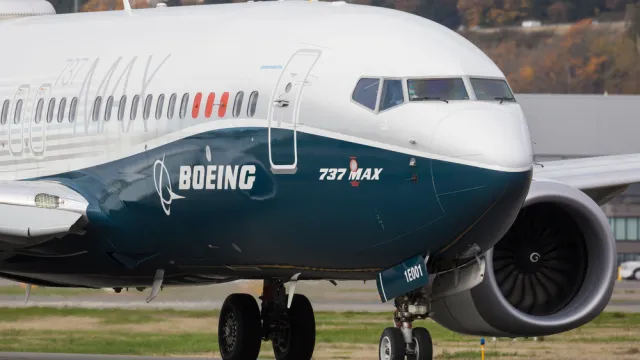United and Alaska Are Canceling Hundreds of Flights Due to Boeing Safety Concerns

Very few travelers take for granted that getting on a plane is safer now than at any other point in history. But last week, an Alaska Airlines flight from Portland, Oregon to Ontario, California was forced to make an emergency landing after a door plug blew off not long after takeoff. Miraculously, none of the passengers or crew were seriously injured during the incident aboard the Boeing 737 Max 9 aircraft. But now, both Alaska and United Airlines are canceling hundreds of flights as they tend to safety concerns with the Boeing model in their fleets.
RELATED: Southwest Passengers Demand Airline Put an End to Early Boarding “Scam.”
On Jan. 10, Alaska Airlines announced on its website that it would be grounding all flights serviced by 737 Max 9 planes through at least Saturday, Jan. 13. The airline estimated that this would affect “between 110-150 flights per day” as it carried out the necessary inspections. This equates to about 20 percent of the airline’s total schedule, Reuters reports.
“We regret the significant disruption that has been caused for our guests by cancellations due to these aircraft being out of service,” the carrier wrote. “However, the safety of our employees and guests is our highest priority, and we will only return these aircraft to service when all findings have been fully resolved and meet all [Federal Aviation Administration] FAA and Alaska’s stringent standards.”
United Airlines—which has 79 of the affected airplane models in its fleet—is also shuffling its schedule, The Washington Post reports. On Jan. 11, the carrier had canceled 194 flights by midday, constituting 7 percent of its total operations, per aviation data website FlightAware. However, the airline previously clarified that it was swapping in other available aircraft to help cover the shortage and that some cancelations might be unrelated to the Boeing grounding.
The changes come days after the FAA ordered all Boeing 737 Max 9 jets grounded on Jan. 6. Alaska and United both said on Jan. 8 that initial inspections had uncovered loose parts on the planes, Reuters reported.
Meanwhile, both airlines say they are waiting for more clarification from the FAA and Boeing on what will be required to clear affected planes for flight once again, The Post reports. And while this could mean another week of scheduling headaches, officials say operations will only return to normal when everything has been deemed secure by all parties.
“The only consideration on the timeline is safety,” Transportation Secretary Pete Buttigieg told reporters on Jan. 10. “Until it is ready, it is not ready. Nobody can or should be rushed in that process.”
In an all-hands meeting with employees at the Renton, Washington, factory that produces the 737 Max 9, Boeing CEO Dave Calhoun called the door plug incident a “mistake.” He said the company is determined to work with regulators to get to the bottom of what caused it, NBC News reports.
“We’re going to approach it with 100 percent and complete transparency every step of the way,” he said.
RELATED: For more up-to-date information, sign up for our daily newsletter.